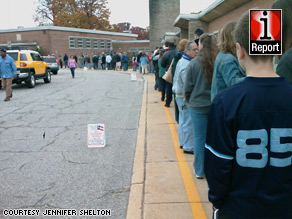Sen. John McCain said Tuesday night that he was "looking forward to the election results."

Jennifer Shelton of Catonsville, Maryland, said she had to wait almost 40 minutes to vote Tuesday.
"We had a great ride. We had a great experience. It's full of memories that we will always treasure," he said aboard his election plane.
He and Sen. Barack Obama were both expected to be watching the results come in from their home states.
The first polls closed at 6 p.m. ET in parts of Indiana and Kentucky.
CNN does not project a winner in any state until all polls have closed in that state.
At 7 p.m. ET, all polls will be closed in Georgia, Indiana and Virginia, three states where McCain and Obama are in a close race.
All polls close in Ohio and North Carolina close by 7:30 p.m.
No Republican has won the White House without winning Ohio.
McCain has been campaigning hard in Pennsylvania, a state that voted for the Democratic candidate in the past two presidential elections.
Polls there will be closed by 8 p.m., as will polls in Florida, another key battleground.
The first exit polls out Tuesday reflect what voters have said all along: The economy is by far the top issue on their minds.  Watch more on the top issues »
Watch more on the top issues »
Sixty-two percent of voters said the economy was the most important issue. Iraq was the most important for 10 percent, and terrorism and health care were each the top issue for 9 percent of voters.
Election Night in America
Watch history unfold with CNN and the best political team on television.
Tonight, beginning 7 ET
The economy has dominated the last leg of the campaign trail as Sens. Barack Obama and John McCain have tried to convince voters that they are the best candidate to handle the financial crisis.
Voters expressed excitement and pride in their country after casting their ballots Tuesday in what has proved to be a historic election.
When the ballots are counted, the United States will have elected either its first African-American president or its oldest first-term president and first female vice president.
Besides choosing between McCain and Obama -- or a third-party candidate -- voters were making choices in a number of key House and Senate races that could determine whether the Democrats strengthen their hold on Congress.
Poll workers reported high turnout across many parts of the country, and some voters waited hours to cast their ballots.
Reports of minor problems and delays in opening polls began surfacing early Tuesday, shortly after polls opened on the East Coast.
Among them: Palm Beach, Florida, reported minor sporadic voter machine failures, and wet voters in rainy Chesapeake, Virginia, were being asked to dry off before voting because they were getting their optical-scan ballots wet, according to election officials in those locales.
CNN is asking people to call its Voter Hotline at 1-877-GO-CNN-08 (1-877-462-6608) if they witness any problems or irregularities. Read about election problems
But many said the chance to vote was worth the wait.
"It feels great to be an American today. The best hour and a half of my life," exclaimed Jude Elliot, an eighth-grade social studies teacher in Orangeburg, South Carolina.
Elliot, who has been voting in Orangeburg since 1998, said it usually takes him five minutes to vote, but on Tuesday it took about 90 -- and he arrived at 6:45 a.m.
"Polling station was packed: young, old, black, white, disabled, not," he said. "It was amazing."
Rick Garcia's motivation for voting was more personal. His brother was killed August 1 by a roadside bomb in Afghanistan while he served in the Army.
"It's the main reason why I came to vote: in his honor," said Garcia, of West Palm Beach, Florida. "He would have wanted everybody as American citizens to do it."  Watch a voter explain how he's honoring his brother »
Watch a voter explain how he's honoring his brother »
For many voters, Election Day began well before dawn.
Ronnie Senique, a math teacher from Landover, Maryland, said he got up early and was the first one at the polls when he arrived at 4:10 a.m., almost three hours before the polls opened.
By the time he left, "the lines were around the corner. They snaked around the school. They went into the street," Senique said.
Tuesday was Senique's first time to vote in a U.S. presidential race. Senique, who is from the Bahamas, became a U.S. citizen about three years ago.
High turnout was not necessarily a theme at every polling station around the country. iReport.com: Share your Election Day experience
"I was there at 10 in the morning, and I jokingly said the [entire] line was my wife -- and that's only because I let her through the door first ," said Nathan Grebowiec, a 27-year-old resident of Plainville, Kansas.
The presidential candidates both voted early in the day before heading out to the campaign trail one last time.  Watch Obama family at polls »
Watch Obama family at polls »
iReporter Lindsey Miller, 23, votes at the same polling place as Obama. She said Secret Service agents were checking names off a list and using metal-detecting wands on some would-be voters as they entered the polling place. The line was around the block at 6 a.m., she said.
"A lot of people were in pajamas. I know I was; not the time you want to be on national TV," the University of Chicago graduate student said. Read what Obama is up to Tuesday
Tuesday also marked the end of the longest presidential campaign season in U.S. history -- 21 months -- and both candidates took the opportunity to make their final pitch to voters.
As McCain and Obama emerged from their parties' conventions, the race was essentially a toss-up, with McCain campaigning on his experience and Obama on the promise of change. But the race was altered by the financial crisis that hit Wall Street in September.  Watch how this election is history in the making »
Watch how this election is history in the making »
Obama began to pull away in the polls nationally as well as in key battleground states. A CNN poll of polls calculated Tuesday showed Obama leading McCain 52 percent to 44 percent, with 4 percent undecided.
Obama also opened a lead in the race for electoral votes. As of Monday, CNN estimated that Obama would win 291 electoral votes and McCain would win 157, with 90 electoral votes up for grabs. To win the presidency, 270 electoral votes are needed.
Although most of the attention has been focused on the presidential race, the outcome of congressional elections across the country will determine whether the Democrats increase their clout on Capitol Hill.
Few predict that the Democrats are in danger of losing their control of either the House or the Senate, but all eyes will be on nearly a dozen close Senate races that are key to whether the Democrats get 60 seats in the Senate.
With 60 votes, Democrats could end any Republican filibusters or other legislative moves to block legislation.
Many political observers also predict that the Democrats could expand their majority in the House.
Voters will also weigh in on a number of ballot initiatives across the country, many of them focused on social issues like abortion and affirmative action. Check out the hot-button issues on the ballot








